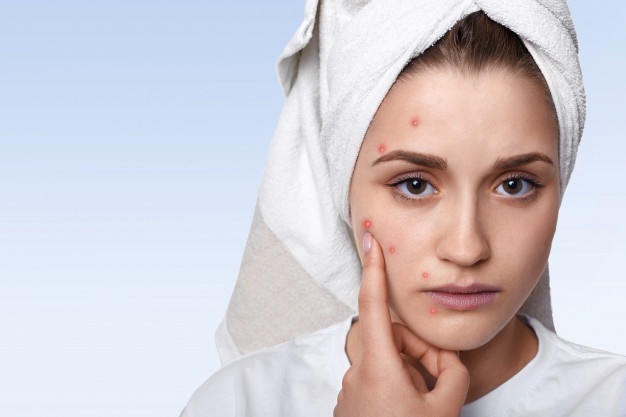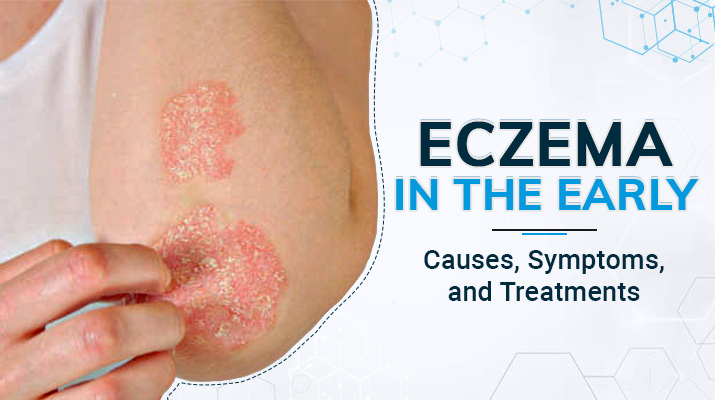Overview
If you suffer from eczema, you can trust that you’re not alone. Millions of people deal with this chronic inflammatory disorder daily. But it’s not only adults that deal with the condition. In fact, between 10% and 20% of all children will have eczema at some point in their lives. The condition is known to cause raised, itchy red patches along the skin and can occur due to many different skin problems. It also affects both males and females equally and is common for those that suffer from allergies or asthma.
Typically, eczema, also known as atopic dermatitis, begins in early childhood but can manifest at any age. It’s non-contagious and tends to dissipate with age but can be a painful and troublesome skin condition for many toddlers and pre-teens. But what exactly causes it?
Causes of Eczema
Eczema is typically provoked by immune system issues, genetics, allergies, and stress. Let’s take a look at a few of these in more detail:
• Immune System
Eczema can be caused by an overactive immune system that’s constantly fighting irritants or allergens. This overreaction can irritate and inflame the skin.
• Environmental Triggers
There are tons of things in the environment that can cause skin irritation.
• Genetics
If your family has a genetic predisposition for dermatitis, you’re more likely to develop the condition yourself. Additionally, if your family has a history of asthma and allergies, it will also increase your chances of having eczema.
• Stress
Increased stress levels can cause or exacerbate eczema symptoms. For example, heightened anxiety levels can spur skin inflammation and worsen present eczema symptoms.
Types of Eczema
Eczema comes in several different forms, each with its own symptoms and triggers.
• Atopic Dermatitis
One of the most common forms of eczema, Atopic Dermatitis, tends to start during childhood and become milder over time. Many people with atopic dermatitis experience rashes, thick bumpy patches, and infections on the skin. It’s typically caused by immune system problems, environmental triggers, and genetics.
• Contact Dermatitis
Contact Dermatitis is a form of eczema caused by a reaction to a substance that makes contact with your skin. This can be an allergy-based reaction after contact with certain latex products and metals. But it can also manifest as a result of a chemical being introduced to the skin’s surface.
• Dyshidrotic Dermatitis
This form of dermatitis appears as tiny, fluid-filled blisters that form on your hands and feet. Dyshidrotic dermatitis can be caused by allergens, moisture on hands and feet, metal exposure, and even stress levels.
• Nummular Dermatitis
Nummular eczema is a condition where coin-shaped spots appear on the surface of your skin. This type of eczema looks different than other forms and is normally triggered by the reaction to an insect bite, chemicals, or metals.
• Stasis Dermatitis
This type of dermatitis occurs in patients that have difficulty with blood flow to their lower legs. This condition happens when the valves responsible for pushing blood through your legs malfunction, allowing blood to pool in your legs. This condition can lead to varicose veins.

How to Treat Eczema
The exact causes of eczema are unknown. However, it’s thought that children likely develop the condition due to genetic precursors and environmental triggers. But how exactly do you treat this skin disorder? While there is no cure for eczema, treatments for this disease can significantly reduce symptoms and flare-ups. Below, we’ve put together a few ways to minimize eczema symptoms.
• Take cooler showers
Taking hot showers can cause skin irritation and breakouts. To safely cleanse your skin, you’ll want to use lukewarm water to wash away dirt and irritants.
• Use mild soaps and cleansers
Some body washes and soaps are made with chemicals that cause flare-ups and allergic reactions.
• Avoid touching face
Touching your face can transfer oils, chemicals, and contaminants to other areas of your skin, causing breakouts and inflammation.
• Avoid potential triggers
Certain chemicals and agents can trigger reactions in your skin. By paying attention to how your body reacts to specific environmental components, you can develop a better understanding of what materials and situations to avoid.
Diagnosing Eczema
For a formal diagnosis, you’ll want to consult with a dermatologist or healthcare provider. These specialists will take a close look at your skin and ask questions to help determine the root causes of your irritation. Typically, your provider will be able to come to a diagnosis based on sheer visual tests. However, for other cases, an allergy test, blood test, or skin biopsy may be necessary to determine your exact condition.
Complications of Eczema
For those that suffer from eczema, complications can include:
• Chronic itchy skin
This condition is known as neurodermatitis and results when you repeatedly scratch a patch of irritated skin, making it worse. Over time, this repeated damage to the skin can cause the area to become thick and discolored.
• Allergic contact dermatitis
Those with eczema are more likely to develop allergic reactions from contact with environmental irritants such as allergens and chemicals.
• Hand Dermatitis
If you suffer from eczema on your hands, cleaning and scrubbing your hands with harsh soaps and disinfectants can cause this condition.
• Asthma
People that regularly suffer from eczema are more likely to experience asthma symptoms.
Prevention of Eczema
There is no particular way to prevent eczema, as it stems from hyperactive immune systems and genetic components. However, there are several treatments and topical remedies that can minimize symptoms.
• Take Shorter Showers
Limiting your shower time while using cooler temperatures can help keep your skin moisturized and healthy.
• Identify and Avoid Exposure to Irritants
Understanding precisely what causes breakouts and flare-ups on your skin can be difficult, but narrowing down the root causes can help you avoid certain chemicals or allergens that might cause skin irritation.
• Use Gentle Soaps
Taking care to avoid harsh clothing detergents and soaps can help you prevent irritation and flare-ups.
Connect with Winston Salem Dermatology Today for Eczema Treatment!
Winston Salem Dermatology is proud to offer a wide variety of modern medical skincare treatments. We treat conditions such as Psoriasis, Eczema, Acne, and much more. We also provide surgical treatments for skin cancers such as basal cell carcinoma, squamous cell carcinoma, and malignant melanoma. Our medically licensed dermatologists can also diagnose and treat many conditions that cause daily issues for millions of Americans.
We also offer a vast array of cosmetic skin care treatments as well! Botox, IPL therapy, dermal fillers, and laser hair and tattoo removal. Our skilled team can help renew your skin’s glow and allow you to look and feel your best! Give us a call today at (336) 774-8636, and let us help you reclaim your glow!


